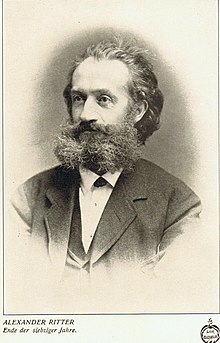Alexander Ritter (musician)
Alexander "Sascha" Ritter (born June 27, 1833 in Narva , Russian Empire , † April 12, 1896 in Munich ) was a German violinist , conductor and composer .
Life
Alexander Ritter was born as the son of a German businessman in Narva, Russia at that time. After the death of her father, his mother Julie and her children moved to Dresden in 1841, where Alexander was able to experience the world premieres of Richard Wagner's Rienzi , The Flying Dutchman and Tannhäuser under the direction of the composer. His mother Julie Ritter was Wagner's first patron in exile, his brother Karl Ritter lived temporarily as a pupil with Wagner in Zurich. Alexander Ritter himself only got to know Wagner personally in 1861, was in correspondence with him and adored him all his life. In 1849 Ritter went to Leipzig and studied the violin with Ferdinand David . Franz Liszt , whom he had already met in Dresden in 1844, granted him a position as a violinist in the Weimar court orchestra in 1854 , where he joined his circle (including Peter Cornelius and Joachim Raff ). In the same year he married the actress Franziska Wagner (1829–1895), a niece of his idol Richard Wagner. This was followed by engagements as a violinist and conductor in Stettin in 1856, in Würzburg in 1863 and in Chemnitz in 1872, each with moderate success. In 1882 he came to the Meiningen court orchestra as concertmaster under Hans von Bülow , where he met the young Richard Strauss , whom he strongly encouraged in the following years (Strauss himself writes in his memoirs of the "decisive factor for my future development"). Like this one, Ritter went to Munich in 1886, where he devoted himself entirely to composing and promoting the young generation of composers in the spirit of the “ New German School ”. Alexander Ritter later wrote the programmatic poem for Strauss' tone poem Tod und Verklerung , which he had printed in the score, brought him closer to the Guntram material for his first opera, and wrote the libretto for Ludwig Thuille's opera Theuerdank .
Works
Alexander Ritter's work, strongly influenced by Richard Wagner and Franz Liszt, includes numerous collections of piano songs based on texts by Heinrich Heine , Nikolaus Lenau , Joseph von Eichendorff and others. a. He also composed the two one-act operas Der lazy Hans (1878) and Wem die Krone? (1889/90), who follow the tendency of German opera after Wagner to use fairy tales and were granted relative success (Ritter is the first to shape the genre of the comic one-act act in the German language). In addition, chamber music - such as the string quartet op. 1 and a lost piano quintet - and finally orchestral works such as Sursum corda !, Erotic legend, Emperor Rudolf's ride to death, etc. a., which were initially based on traditional forms, but developed towards modern symphonic poetry and received programmatic titles.
See also
literature
- Stephan Hörner : Knight, Alexander. In: New German Biography (NDB). Volume 21, Duncker & Humblot, Berlin 2003, ISBN 3-428-11202-4 , p. 661 f. ( Digitized version ).
- Siegmund von Hausegger : Alexander Ritter, a picture of his character and work . Berlin 1907.
- Richard Strauss: Reflections and Memories . Zurich 1949, p. 167 ff.
- Helmut Scheunchen: Lexicon of German Baltic Music. Harro von Hirschheydt Verlag, Wedemark-Elze 2002. ISBN 3-7777-0730-9 , pp. 209-212.
- Michael Hofmeister: Alexander Ritter: Life and work of a composer between Wagner and Strauss , Baden-Baden: Tectum Verlag, [2018], ISBN 978-3-8288-4138-3
Web links
- Sheet music and audio files by Alexander Ritter (musician) in the International Music Score Library Project
- Literature by and about Alexander Ritter in the catalog of the German National Library
- Works by and about Alexander Ritter in the German Digital Library
- Knight, Alexander . In: East German Biography (Kulturportal West-Ost)
Individual evidence
- ↑ Stephanie Schwarz: Fairies and Wine. Richard Wagner. In: Kurt Illing (Ed.): In the footsteps of the poets in Würzburg. Self-published (print: Max Schimmel Verlag), Würzburg 1992, pp. 53-64; here: p. 63 (quoted from a letter from 1872).
| personal data | |
|---|---|
| SURNAME | Knight, Alexander |
| ALTERNATIVE NAMES | Knight, Sascha (nickname) |
| BRIEF DESCRIPTION | German violinist, conductor and composer |
| DATE OF BIRTH | June 27, 1833 |
| PLACE OF BIRTH | Narva , Russian Empire |
| DATE OF DEATH | April 12, 1896 |
| Place of death | Munich |
